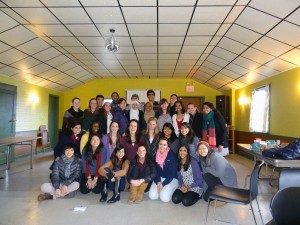
Courtesy of Ria Pal
At a time when networking requires only a few clicks of the mouse, one club on campus is taking connectivity to a new level — all the way to Iquitos, Peru. The UR chapter of GlobeMed is a fairly new club on campus, SA-recognized in the fall 2010 semester and is part of a university network that spans the U.S. with one goal in mind: the promotion of global health and social justice around the world.
Under co-presidents and founders junior Rohini Bhatia and senior Anupa Gewali, the fledgling club has garnered 40 members that work to foster its partnership with international grassroots organization Kallpa Iquitos. As a GlobeMed chapter, UR has been paired with Kallpa Iquitos to identify and solve the public health needs of El Porvenir — an impoverished neighborhood of Iquitos.
Through fundraising and global health education efforts, UR’s GlobeMed is continually focused on “el porvenir,” which means “the future” in Spanish, not only as a club, but as a lifetime partner with a Peruvian community in need.
Campaign Coordinator and sophomore Ria Pal spoke about what UR can expect next from the club.
What made GlobeMed an appealing club to join?
I came into a general interest meeting as a freshman with no background whatsoever in public health, but it very quickly became clear that GlobeMed was unique and valuable in its approach to empowering students and communities. It focuses on giving students opportunities to not only lead and serve, but also learn about public health from an academic standpoint.
What activities does GlobeMed participate in, and what are the effects of the club on the UR campus as well as worldwide?
On campus, our goals are to raise awareness of social justice issues and advocate as well as fundraise for our partner organization, Kallpa Iquitos.
We’ve helped bring last year’s HIV/AIDS discussion panel to campus, shown a free screening of the documentary “Born Into Brothels” and held our “Fish are Friends” beta fish fundraiser.
Some of our events are part of a larger effort — on World Day of Social Justice (Feb. 20), for example, all 46 GlobeMed chapters are conducting a teach-in, where professors who don’t normally talk about social justice issues will spend a few minutes explaining how public health is relevant to their field.
What is one thing students might not know about GlobeMed just from reading about it on the Students’ Association website?
Unlike a lot of other groups that provide temporary external relief to struggling communities, our model stresses sustainability via community-driven development.
We are in regular contact, from Skype calls to on-site work to a pen pal system, with our long-term partner organization, a wonderful Peruvian grassroots group called Kallpa Iquitos in Iquitos, Peru. They tell us what problems they identify in their community, primarily issues of youth engagement, violence and pollution. We help Kallpa mobilize resources to apply solutions that they have developed and will implement themselves.
What makes Peru significant to the mission of GlobeMed? How was it selected as your club’s focus?
The GlobeMed National Office, which links and oversees each chapter, seeks out effective grassroots organizations in communities around the world, from Haiti to Detroit.
When we became a chapter, we were matched up with Kallpa in the same way that, for example, GlobeMed at Massachusetts Institute of Technology was matched to a women’s health group in Laos.
We’ve now been working with Kallpa for over a year. We’ve helped fund vocational workshops, much-needed safety and sanitation improvements at their youth center and an accessible playground in a region that is flooded most of the year.
Last summer, two of our members worked alongside Kallpa in Iquitos and we’re sending three more this summer.
Can you say a bit more about the upcoming benefit that you’re holding on Feb. 25? Why should students attend?
Our upcoming benefit dinner is called Hope in Health. It’s being co-sponsored by ASL Club and will be held in the Meliora Restaurant from 5:30 – 8 p.m.
We’re incredibly fortunate to have Davin Searls, the executive director of Discovering Deaf Worlds — an amazing Rochester-based initiative focused on Deaf education and awareness in developing countries — speaking about his work.
Students should attend if they believe in global health, would like to learn about innovative public health work happening on campus and in their community, want to support GlobeMed and ASL and enjoy delicious food.
Other than the benefit, are there other upcoming events that UR can look forward to?
We’re actually very excited to bring a series of theater workshops to campus called Theatre of the Oppressed as a part of our World Week of Social Justice. Theatre of the Oppressed is a hugely empowering South American theater technique that uses audience-actor interactions to creatively demonstrate ways out of oppressive situations.
The first of these workshops will be held on Feb. 17. The second workshop, led by TOOP’s writing guild, will be on Feb. 20 and the final part — a production — will be on Feb. 24.
Olfano is a member of the class of 2012.

